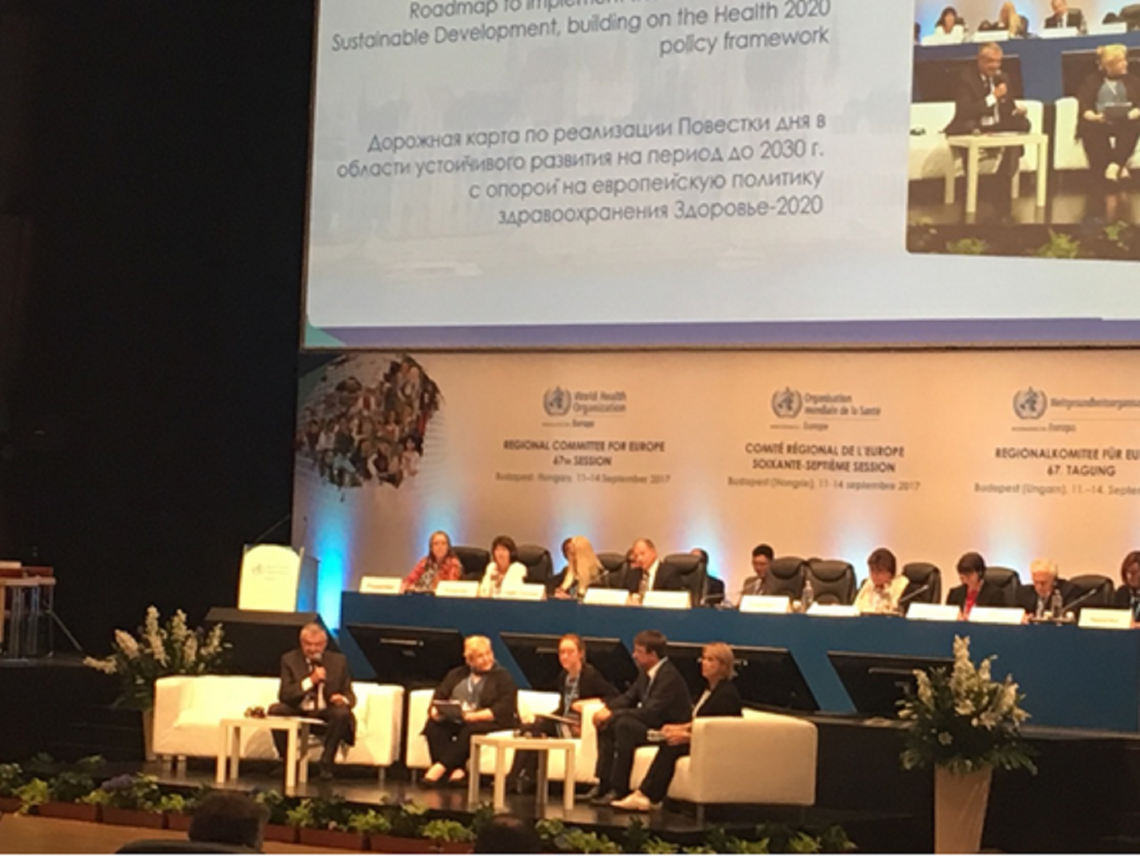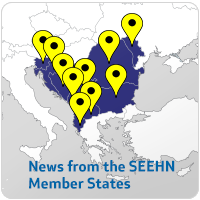
67th WHO Regional Committee for Europe, Budapest, Hungary 11-14 September 2017
Short statement:
South-eastern Europe Health Network (SEEHN) was presenting its vision and perspectives of the SEEHN Member States to the delivery on the Agenda 2030/SDGs and on the implementation of the Health2020 in the SEE region, in a Panel on Roadmap to implement the 2030 Agenda for Sustainable Development, building on the Health 2020 policy framework, at the 67th WHO Regional Committee for Europe, Budapest, Hungary 11-14 September 2017.
Technical details:
Moderator: Dr Mihaly Kokeny
Panelists:
- Dr Mira Jovanovski Dasic, SEEHN
- Peter Beznec, Regions for Health Network
- Joan Devlin, Chief Executive, Belfast Healthy Cities & Secretariat Lead, WHO European Health Cities Network
- Nina Renshaw, Secretary General, European Public Health Alliance
Panel notes:
- Dr Mihaly Kokeny set the scene by presenting the panelists and sharing the overall goal of the panel, to share the experiences of the regional and sub-regional cooperation mechanisms and networks in delivery on the Agenda 2030 and the Sustainable Development Goals (SDGs).
- Dr Mira Jovanovski Dasic, SEEHN Secretariat, has spoken on the importance of SDGs/Agenda 2030 and Health2020 for the SEE region, by emphasizing the newly endorsed Chisinau Pledge, which has set up SEEHN strategic directions towards implementing of the SDGs 2030; she elaborated on the success public health stories in the 16 years of existence of the
 SEEHN, and the modalities through which the SEEHN at sub-regional level as well as its Member States will address the SDGs and Health 2020. SEEHN has been working intersectorally on health and wellbeing since 2012, as all SEEHN Member States have committed to the implementation of Health2020, and through the SEE Regional strategy. SEEHN appreciates and strongly supports the WHO engagement and WHO instruments, including the SDGs Road Map as a valuable guidance in delivering the Agenda 2030 and SDGs.
SEEHN, and the modalities through which the SEEHN at sub-regional level as well as its Member States will address the SDGs and Health 2020. SEEHN has been working intersectorally on health and wellbeing since 2012, as all SEEHN Member States have committed to the implementation of Health2020, and through the SEE Regional strategy. SEEHN appreciates and strongly supports the WHO engagement and WHO instruments, including the SDGs Road Map as a valuable guidance in delivering the Agenda 2030 and SDGs. - Mr Peter Beznec, Regions for Health Network, was sharing the experience from the Regions for Health Network, in particular on the Slovenia’s Pomurje Region in intersectoral collaboration for better health, and engagement of local actors in different sectors for health and economic development.
- Joan Devlin, WHO European Health Cities Network, highlighted the importance of intersectoral collaboration for health, through examples from the Healthy Cities Network – all sectors speak ‘different’ technical or professional language, and this challenge should be converted into opportunity to bringing everyone on the same page. It is often easier to learn the ‘languages’ of other sectors than to expect them to learn the ‘health’ language. And SDGs offer great opportunity for that.
- Nina Renshaw, EPHA, has spoken on specific items of urgent importance requiring intersectoral collaboration, namely the antimicrobial resistance (AMR) and prevention of NCDs, and especially the role of the civil society, which is a good will partner and can contribute significantly to addressing these issues and thus contributing to the national and regional agendas to deliver on SDGs. It is of highest importance to get everyone – all sectors side by side with health sector – aboard, in order to sustain good outcomes of investments made in and for health, by health and other sectors.
Dr Mihaly Kokeny summarized the discussions of the panel highlighting the importance of partnerships and the value of regional and subregional networks to this end, and closed with a quote from Mark Twain: “Even if you are on the right track, you will get run over if you’re just sitting there.”





